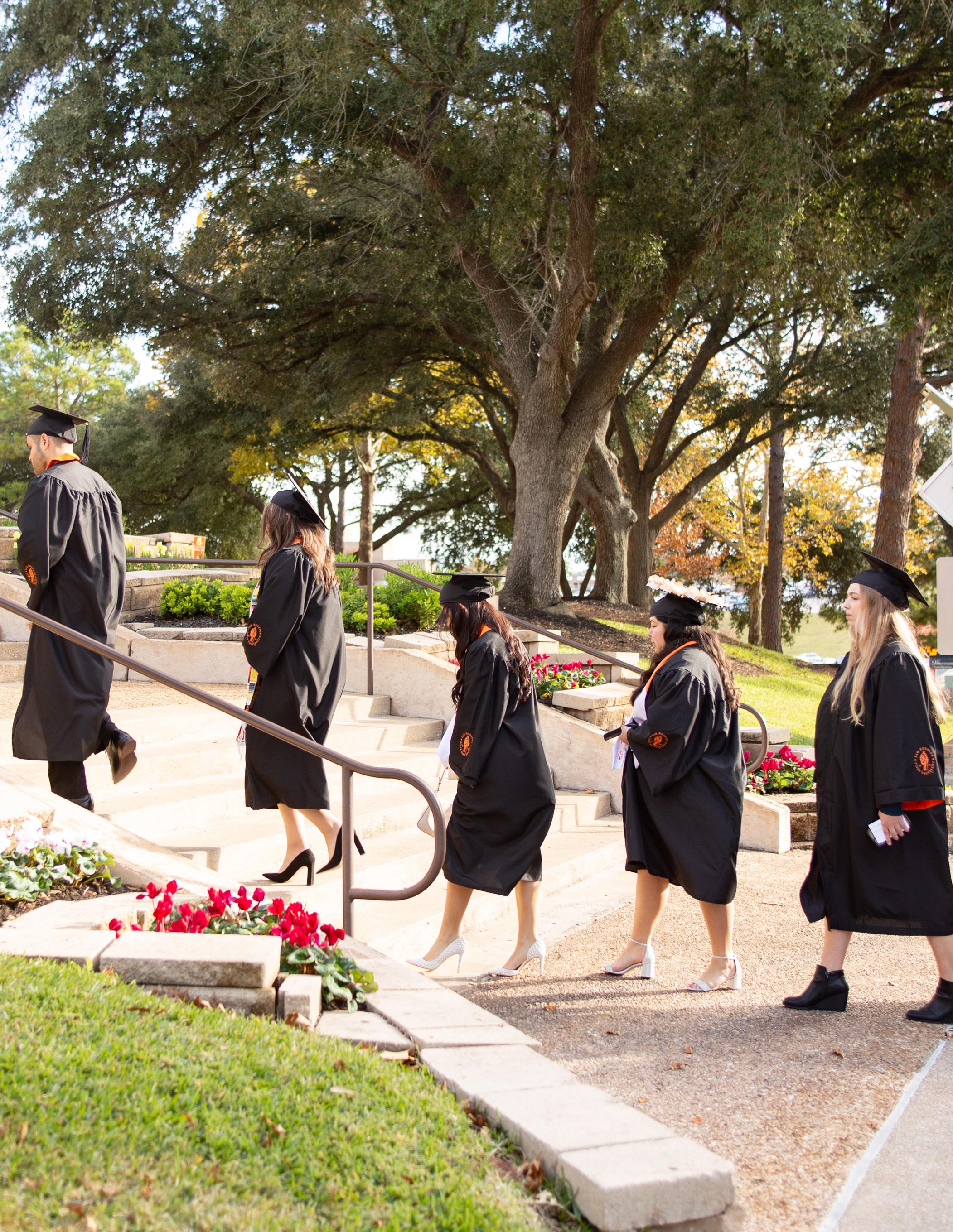

THE DIALOGUE
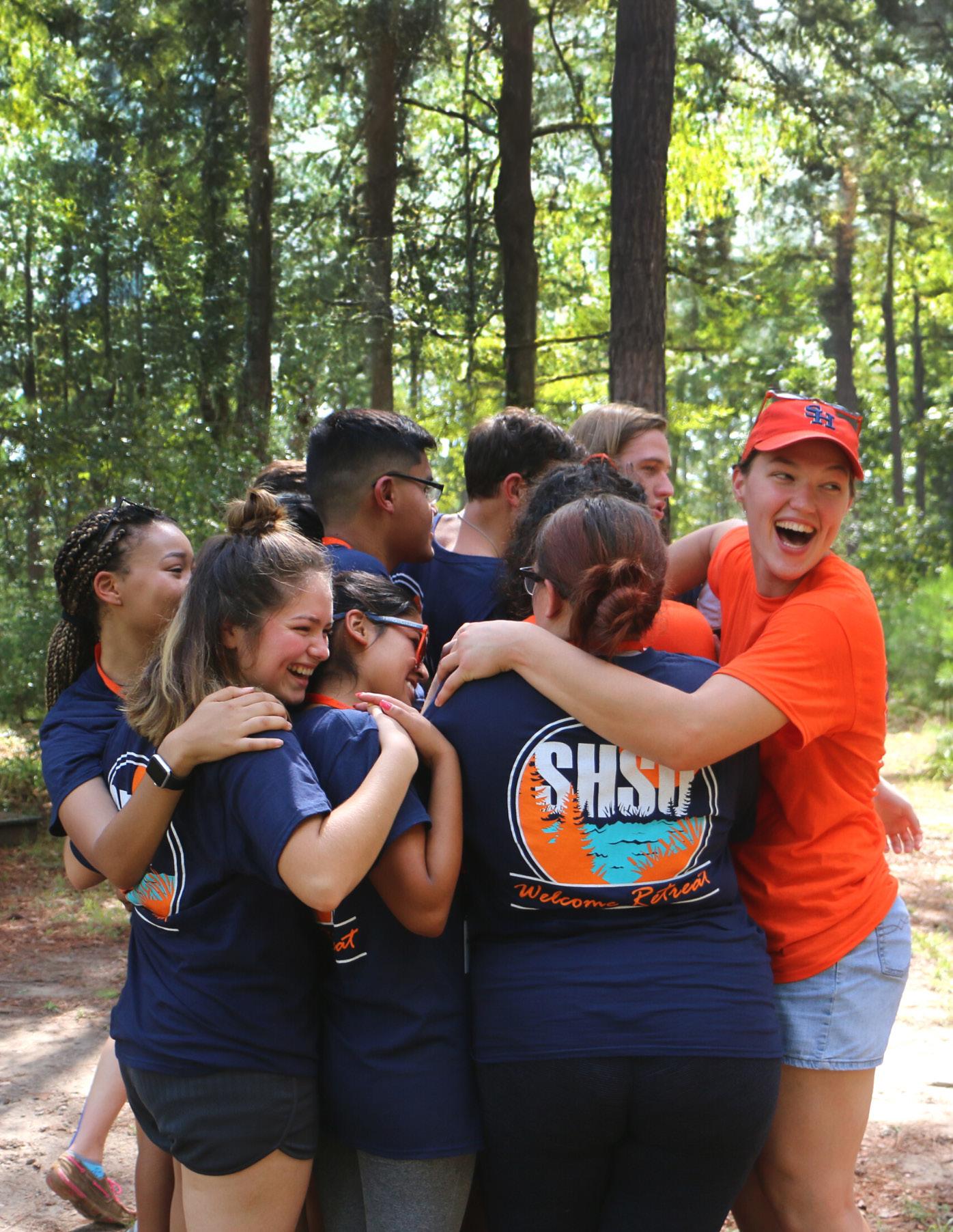

04 06 08 11 14 18 20
WELCOME FROM THE DEAN
INTERVIEW WITH OLIVIA DISCON: STUDENT REGENT
FEATURE SEMINARS
ALUMNI SPOTLIGHT
TWO MINDS, ONE MISSION
BIG IDEAS, BOLD RESEARCH BOWERS SCHOLAR YEAR ’24 – ’25 AT A GLANCE
EXCELLENCE IN EVERY FIELD YOUR IMPACT, THEIR FUTURE 21 22 23
Welcome to the latest edition of The Dialogue! Whether you are a student, faculty member, alumna/us, or friend of Honors, we are grateful for your engagement with and commitment to excellence as embodied by our students.
The Elliott T. Bowers Honors College is a place where intellectual curiosity, creativity, and a passion for learning thrive. Each year, we celebrate the achievements of our students and faculty, highlight exciting opportunities for academic and personal growth, and share stories that reflect our community’s values. This newsletter serves as a window into the remarkable work being done by our scholars as well as a resource to keep you connected and informed.
In this edition, you will find inspiring student spotlights, seminar highlights, thesis features, and reflections from our distinguished faculty and alumni. I encourage you to discover the many opportunities available to our students— from research funding, conferences, and study abroad programs to leadership and community-engagement initiatives—that have contributed to their educational and professional goals.
Finally, I invite you to share your stories, accomplishments, and ideas by emailing us at honors@shsu.edu. Our college is strengthened by the contributions of each of you, and we look forward to celebrating your successes in our next newsletter. Thank you for being part of our vibrant college. I hope you find this newsletter both informative and inspiring.
With best wishes,

Kimberly Bell, Ph.D. Dean, Elliott T. Bowers Honors College Professor of English
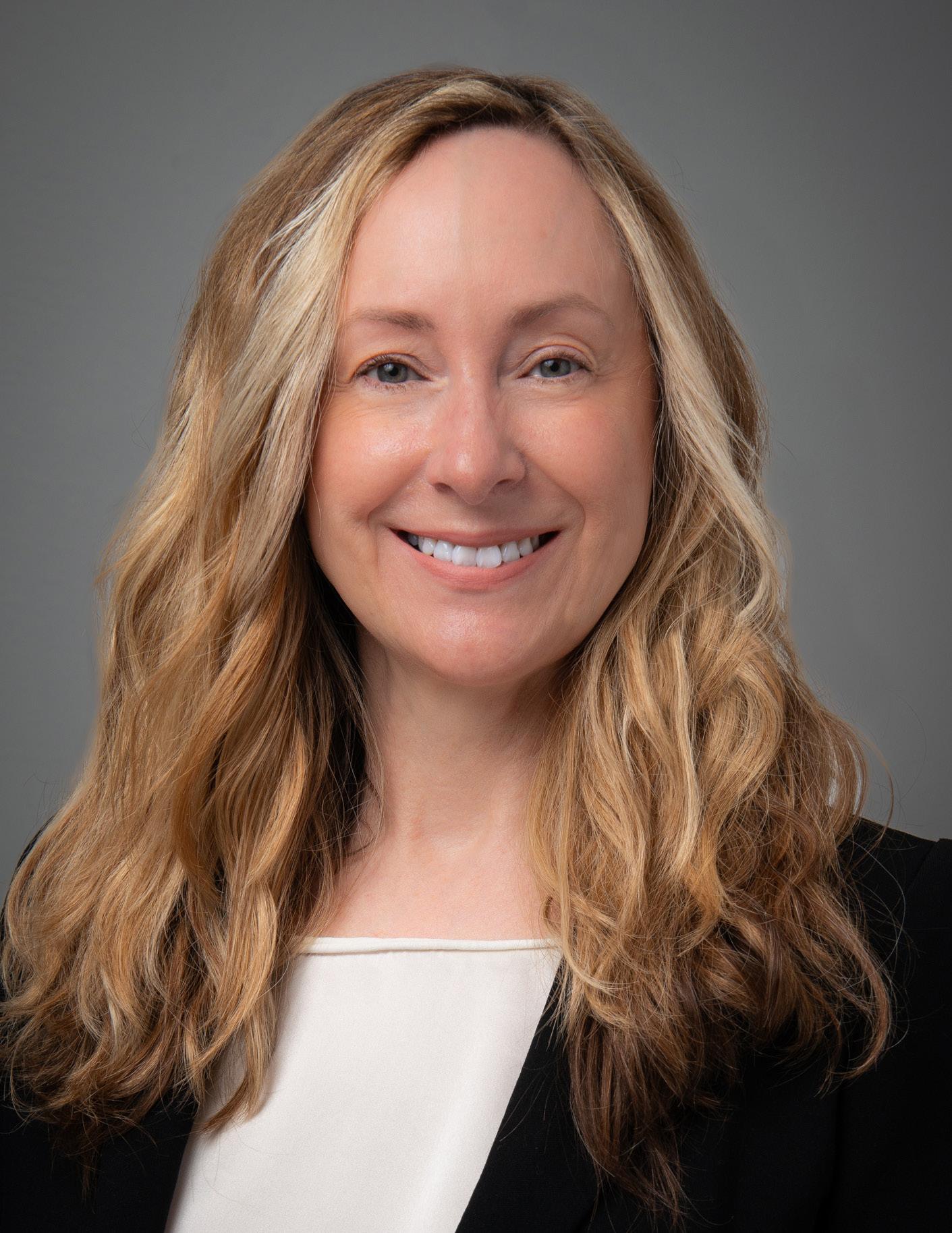
WELCOME FROM THE DEAN
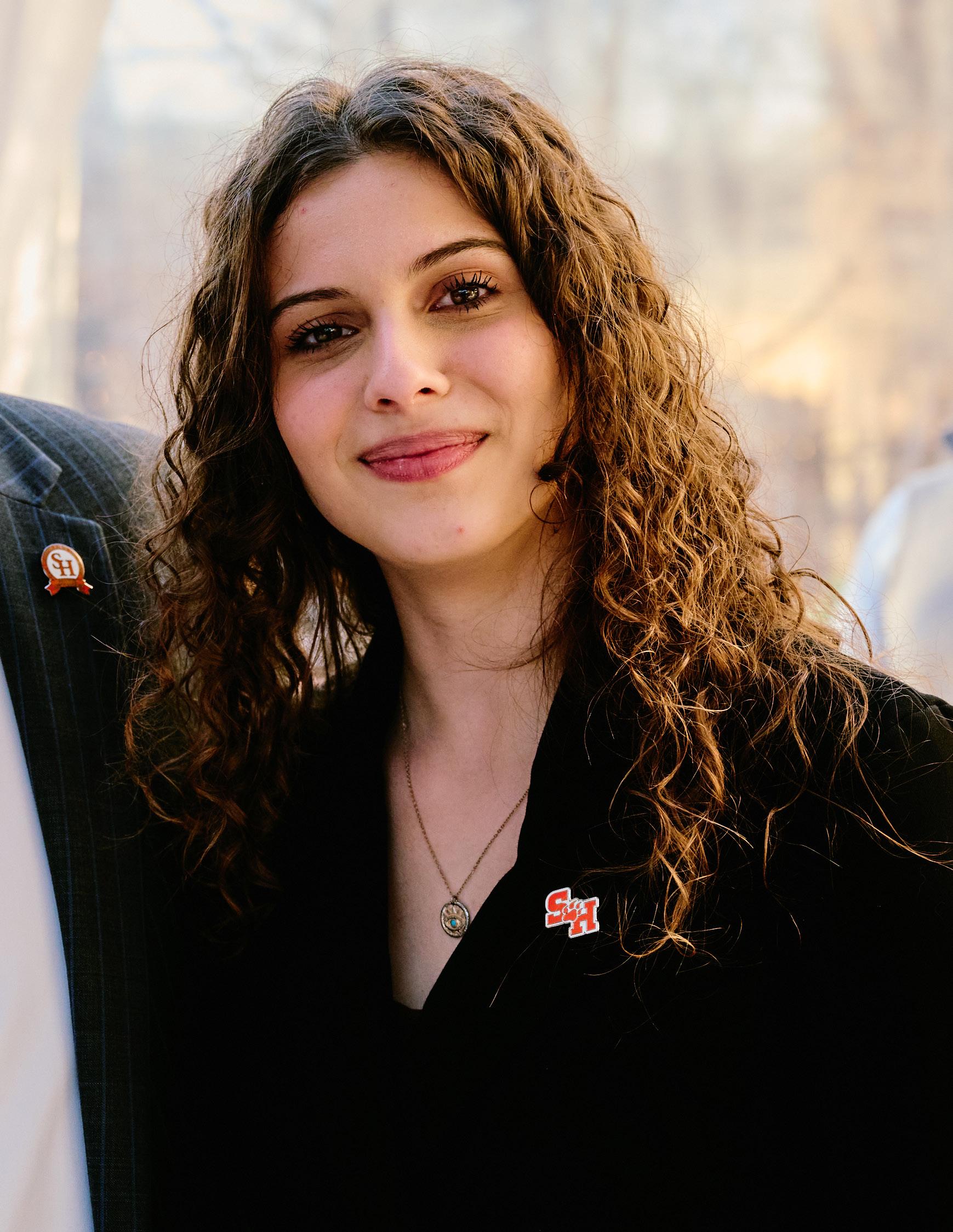
INTERVIEW WITH OLIVIA DISCON
“THE HUNTSVILLE COMMUNITY IS OUTSTANDING, AND THE WAY THAT IT INTERSECTS WITH THE UNIVERSITY WILL ALWAYS BE MY FAVORITE COMPONENT OF BEING A STUDENT HERE.”
– OLIVIA DISCON
At the beginning of the spring semester, I had the privilege of sitting down with Olivia Discon, Sam Houston State University’s very own Texas State University System (TSUS) Student Regent. A junior criminal justice major with an English minor, Olivia is also an Honors student, president of the Pre-Law Society, president of the Law, Engagement, and Politics (LEAP) program and Assistant to the City Manager for the City of Huntsville.
Originally from Long Island, New York, Discon moved to Cypress, Texas, with her family at a young age.
“A lot of people were leaving New York for Texas, and my family was part of that trend,” she said.
While she may not be a native Texan, she made it official last year when she was baptized as a Texan on Texas Independence Day, a local tradition in Huntsville.
Discon originally considered forensic psychology and institutional law before deciding on SHSU.
“What really sold it for me, though, was the giant Sam Houston statue on the side of I-45. I knew I was going somewhere special,” she said.
The process of becoming Student Regent was not something Discon initially expected to pursue. “This was an opportunity that I didn’t know about. I was intimidated, but I spent my first two years being involved on campus, volunteering a lot and finding ways to be aligned with the TSUS mission of holding myself to a higher standard. I think most people wonder what a Student Regent is and what their exact role is in the system. I am a voice for the students which is mostly geared towards policy in representing all seven institutions as opposed to just my home university.”
Discon applied for the position as a sophomore and was ultimately appointed by Governor Greg Abbott.
Interview by Lindsey Rowley
In addition to her Student Regent responsibilities, Discon is highly active in campus and community life. She values the connections she has built through her involvement.
“I really like how the Honors College implores students to engage with not only Sam Houston’s community, but the Huntsville community, which has a huge need for a student presence. The Huntsville community is outstanding, and the way that it intersects with the university will always be my favorite component of being a student here.”
Managing multiple roles is a challenge, but Discon has learned how to balance her responsibilities effectively.
“It’s really about understanding that sacrifices will have to be made. Sometimes that means staying up an extra hour to finish an assignment or rearranging my entire week just to make time for an incredible opportunity. There were times when I was juggling four jobs, and I had to really step back and figure out what was worth my time and how to make everything work.
It’s about recognizing what’s important and making sure that nothing—especially time— becomes a barrier to opportunity,” she said.
Discon’s term as Student Regent will conclude in May 2025, when another student from one of the seven TSUS institutions will take over. Though bittersweet, she expressed gratitude for the experience and excitement for what lies ahead. Her future plans include a career in law, potentially as general counsel or a city attorney. She is passionate about government and public service and hopes to continue working in those fields. Before wrapping up, Discon emphasized the importance of student involvement—both on campus and in the Huntsville community.
“Any student who lives, works and visits here, they have to check out some of the amazing things that are going on around town.”
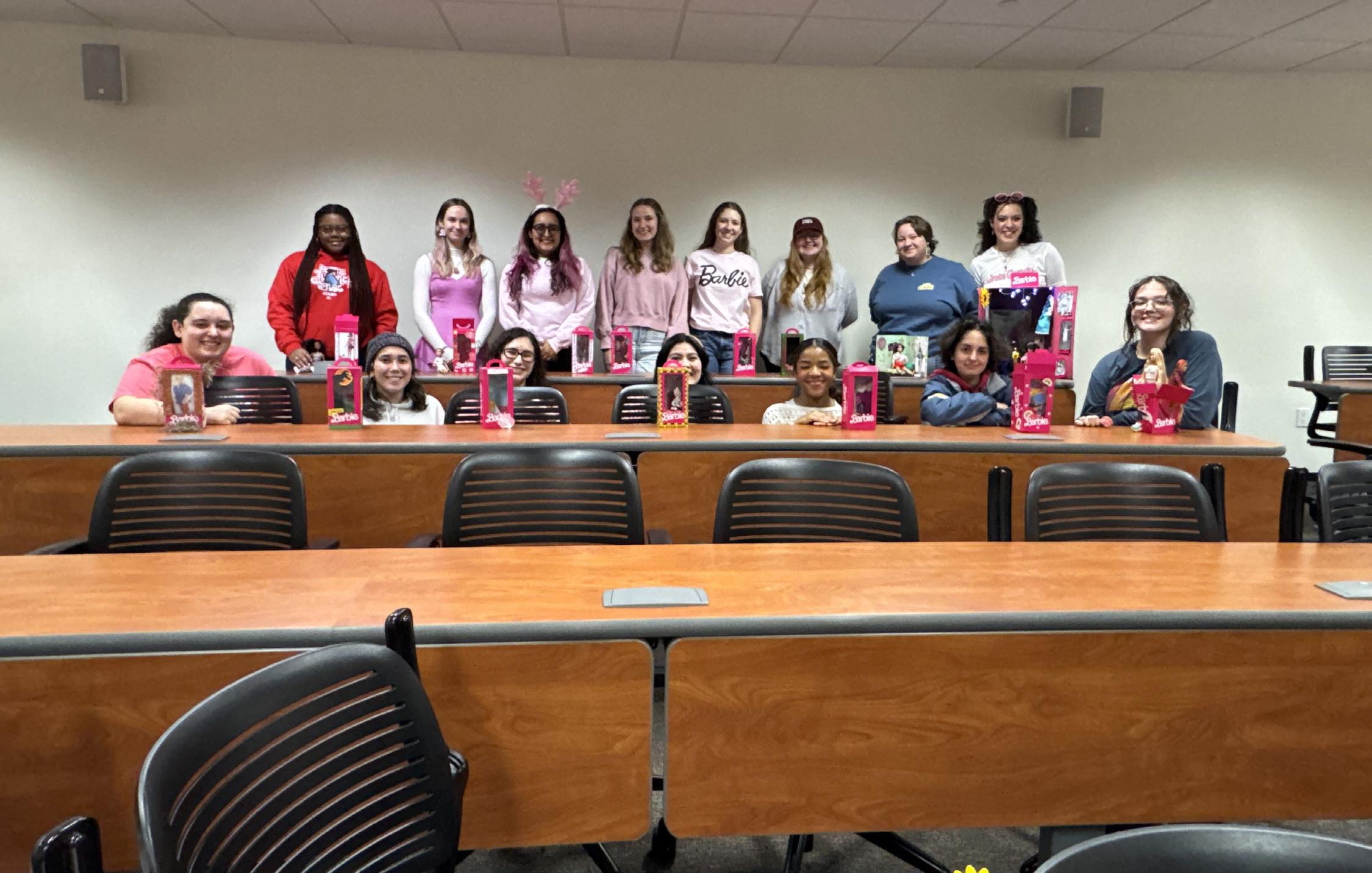
SEMINARS BARBIE HEY BARBIE!
In the fall of 2024, Dr. Ashton Mouton taught a wildly popular seminar on the evolution of Barbie. The year before, Barbie (2023) took the world by storm and sparked revolutionary discourse and study nationwide, even on our very own campus. The course offered a comprehensive look at Barbie, examining her positive and negative impact on children, play, culture, and advocacy. It delved into various topics such as Mattel’s business operations, Barbie’s role in sports and career aspirations, her connection to feminism and the patriarchy, her international presence, and, of course, Barbie the movie.

KUNG FU
Over the last nine years, one of the most popular, recurring seminars in the Honors College is The Word: Culture & Society Kung Fu San Soo. This seminar, taught by Marty Reeder and Rebecca Lewis, accommodates 14-16 students each fall semester in the Reeder’s Kung Fu School, located at 927 Sam Houston Ave.
The focus of the course is on physical fitness and health, mental fortitude, clarity, and relaxation. Kung Fu San Soo emphasizes the understanding that your body is a fortress ready for daily challenges and able to deter the need for self-defense situation, but capable and ready to survive a self-defense situation if one arises. If the mind and body are prepared, one is more likely to avoid such a thing by being aware, confident, and capable.
“The impact is significant to everyday life, every minute, every second; you will have peace and confidence in how you study, how you drive, how you treat others and how you treat yourself,”
Reeder said. “You will find serenity in the training, preparing for battle while staying as far away from it as possible. It is better to be a warrior in a garden than a gardener in a war.”
The course teaches traditional Kung Fu San Soo as it was taught in the monasteries of ancient China. Students learn exercises, fighting skills through forms and drills and intermediate selfdefense strategy and technique. Upon completion at the semester, students earn their first belt in the ancient selfdefense art.
Reeder developed a curriculum for earning a Yellow Belt in Kung Fu (based on his mentor’s teachings and historical methods) that is used for this course. However, since the Honors seminar is an accelerated version (15 weeks instead of 6 months) and because it is done for college credit, written assignments were added to the regular Yellow Belt study (which is based purely on physical performance). Each week, students write a journal entry on what they have learned about Kung Fu techniques, history and philosophy. They also have two larger papers to write – a Kung Fu movie review at mid-term and a final paper summarizing everything they have learned in the semester. There are four physical exams throughout the semester where students demonstrate the forms, drills and lessons they have learned.
While Honors students are required to take two seminars, students choose to take Kung Fu and are genuinely interested in learning.
“KUNG FU SAN SOO HAS TAUGHT ME THE IMPORTANCE OF MAINTAINING A POSITIVE ATTITUDE IN EVERY SITUATION.”
“No student signs up for this course thinking it will be an easy way to earn their Honors credit, and there is no faking it until you make it. Students are out there, proving their knowledge on the mat, in full display,” Lewis said.
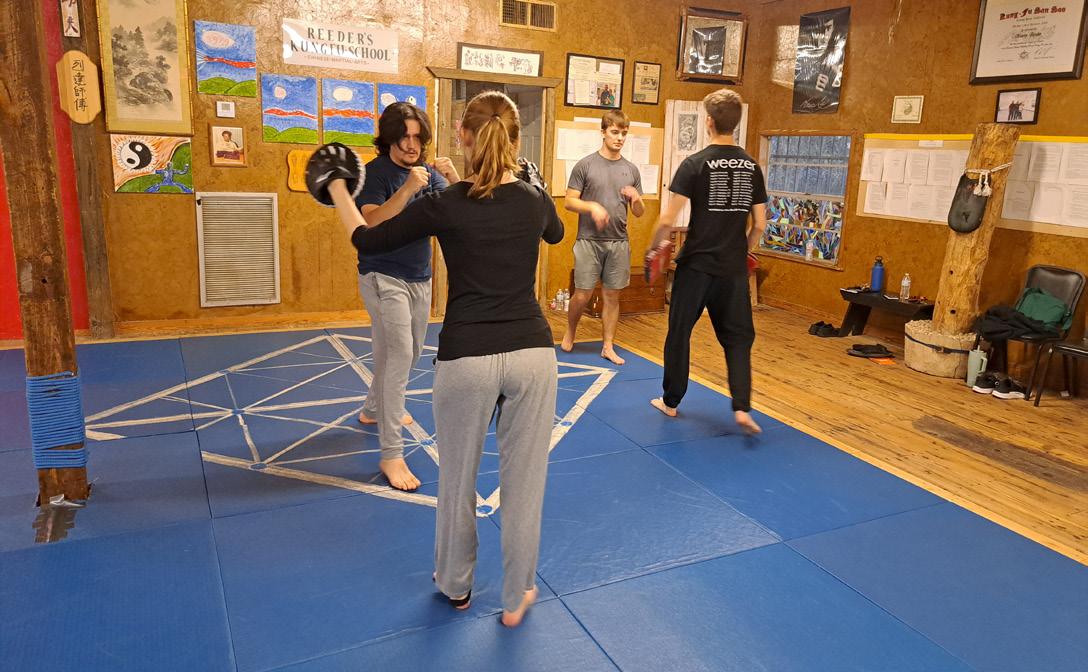
Most students begin the course with a little trepidation and a lot of curiosity and leave with a new set of skills and improved physical and mental fitness. For the instructors, seeing the confidence and enjoyment on students’ faces is incredibly rewarding.
Reeder, a former Honors student, is proud to give back to Sam Houston State. He began working with Honors in 2016. At that point, he taught once a semester as part of the Journeys seminar. The popularity of the class led to the creation of the current semester-long course. When asked if they would continue teaching this course, Reeder and Lewis both responded with a resounding “Yes!” Reeder shared that teaching this course is his favorite time of the year, and he hopes to continue.
In the future, he would like to extend the course and teach upper-level sections every semester to watch the students grow in confidence and the art of Kung Fu San Soo. Completion of a four-year course would help students earn their Black Belt.

DECISION-MAKING SEMINAR
Last fall we held our Decision-Making Seminar, taught by Dr. Steven Koether. This seminar specializes in soft skills like problem-solving, critical thinking, evaluating ideas and arguments, team building and decision-making. While tackling all kinds of decisions (big, small, simple and complex), students are taught to be aware of logic, bias and heuristics. These are all vital skills job markets seek in prospective applicants.
Koether loves working with Honors Students, labeling them as “inquisitive and creative.” He prefers to hire and work with them, as they are dedicated, knowledgeable and a joy to work with. Typical assignments consisted of reflection pieces, case studies and student-led discussions.
“Decision Making is an Academic Community Engaged (ACE) course, meaning student coursework and actions will support the larger Bearkat community through the moderation of deliberative dialogues,” Koether said. “This learning, engagement and hard work earns students Moderator Certification from the SHSU American Democracy Project. This group of students went above and beyond. They earned the majority of the swag and prizes from our American Democracy Project initiatives this year as well.”
“KOETHER LOVES WORKING WITH HONORS STUDENTS, NAMING THEM ‘INQUISITIVE AND CREATIVE.’”
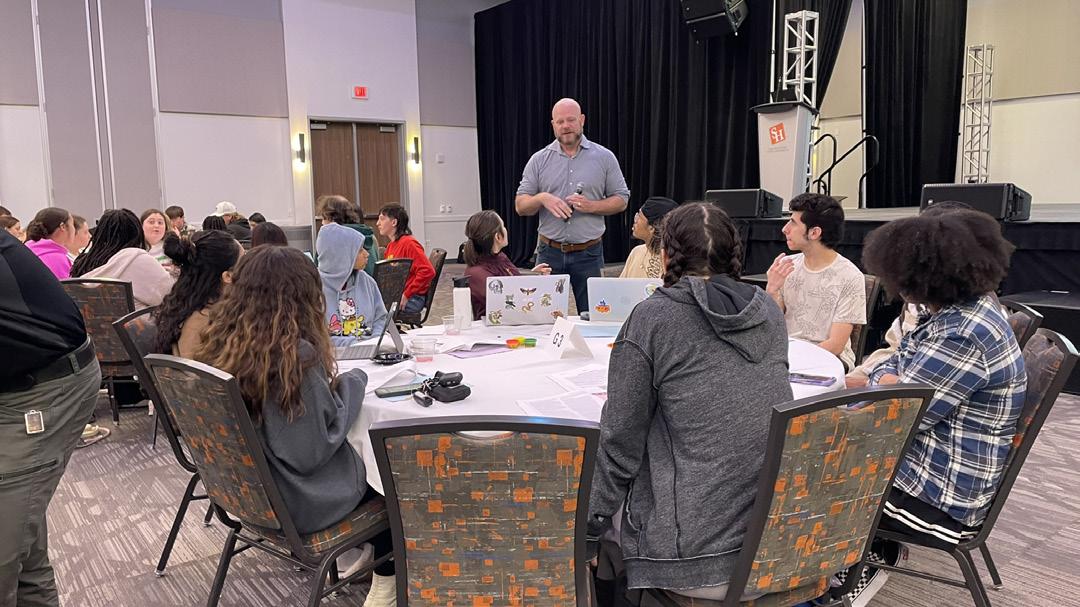
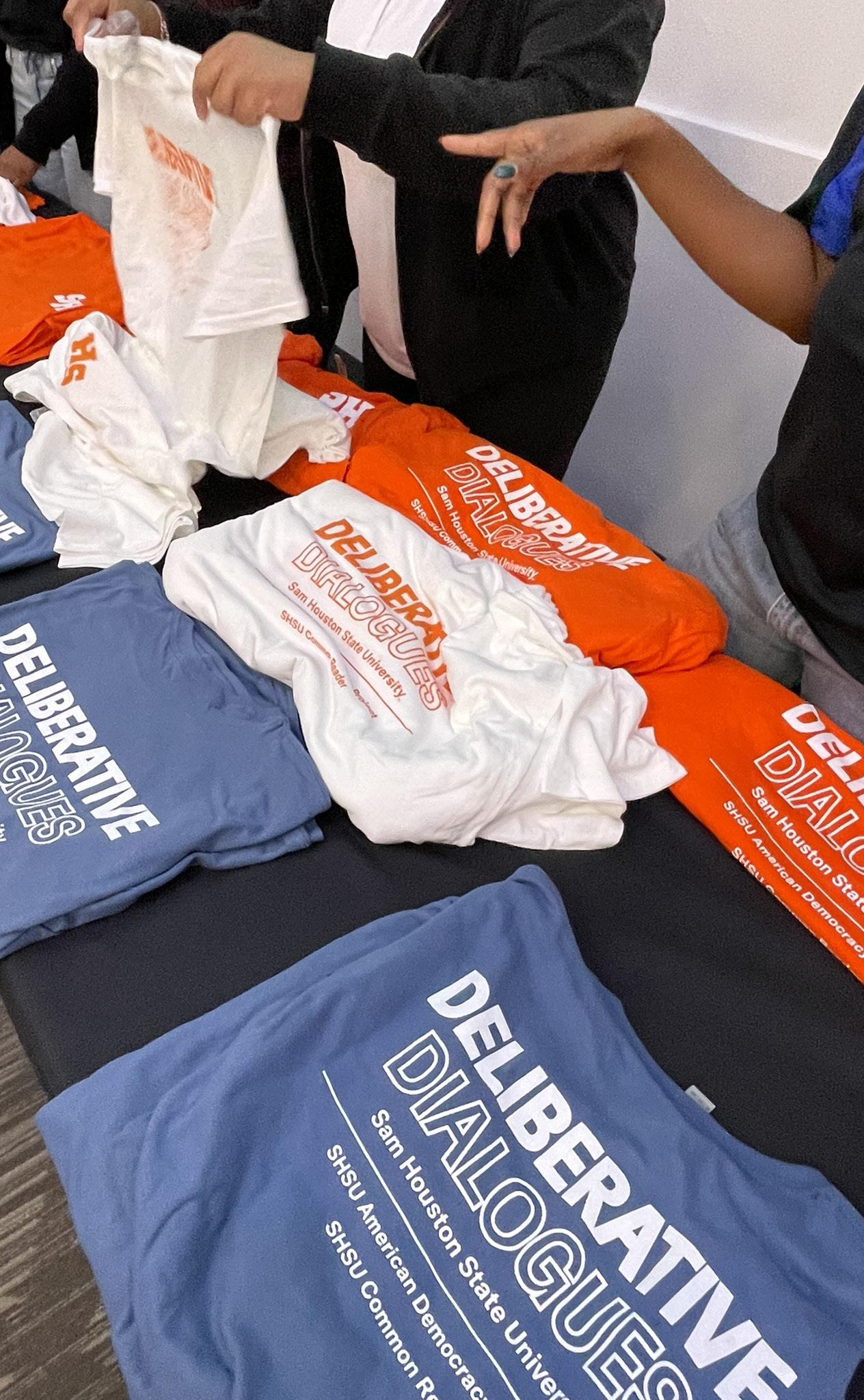
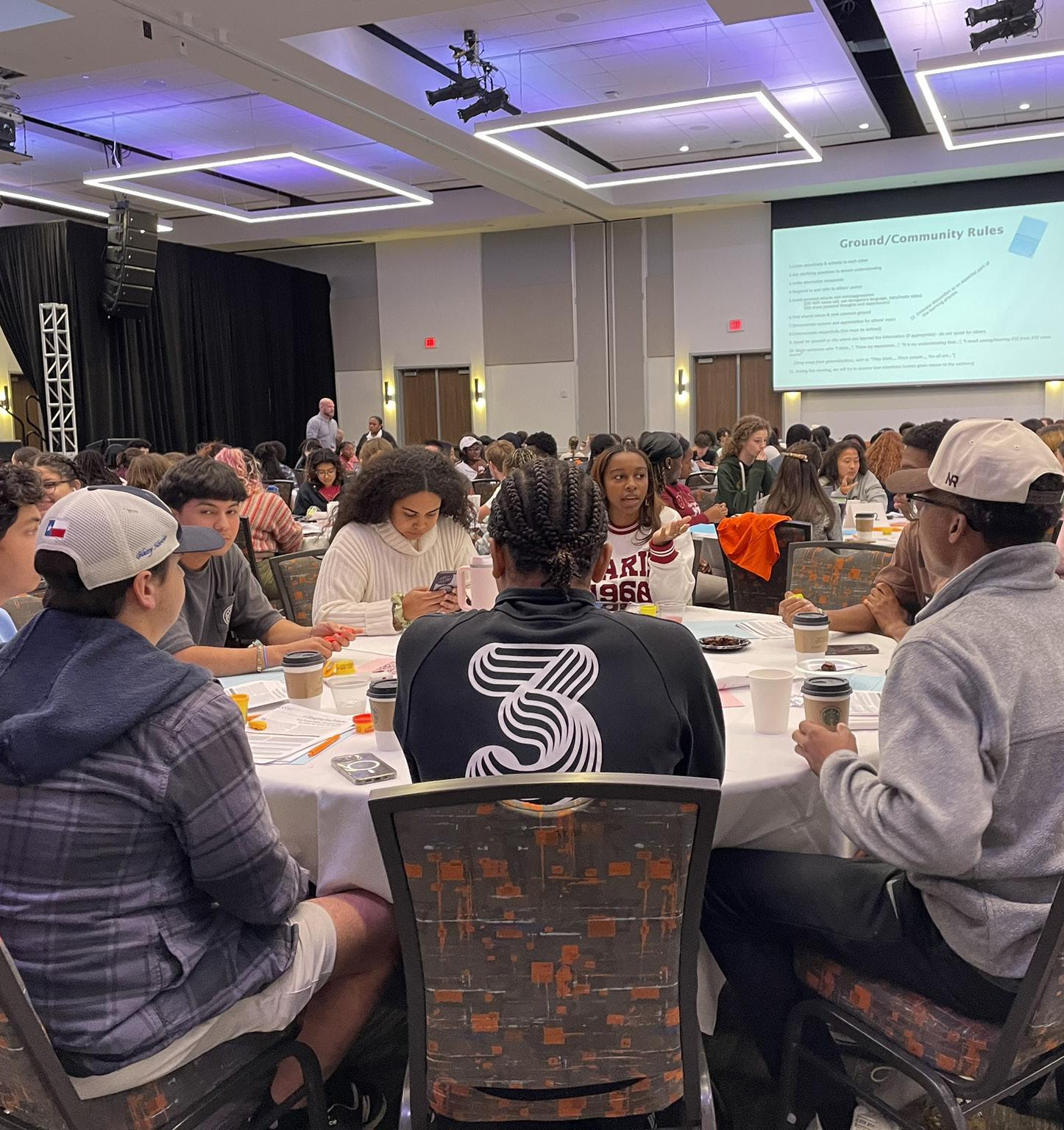
ALUMNI SPOTLIGHT
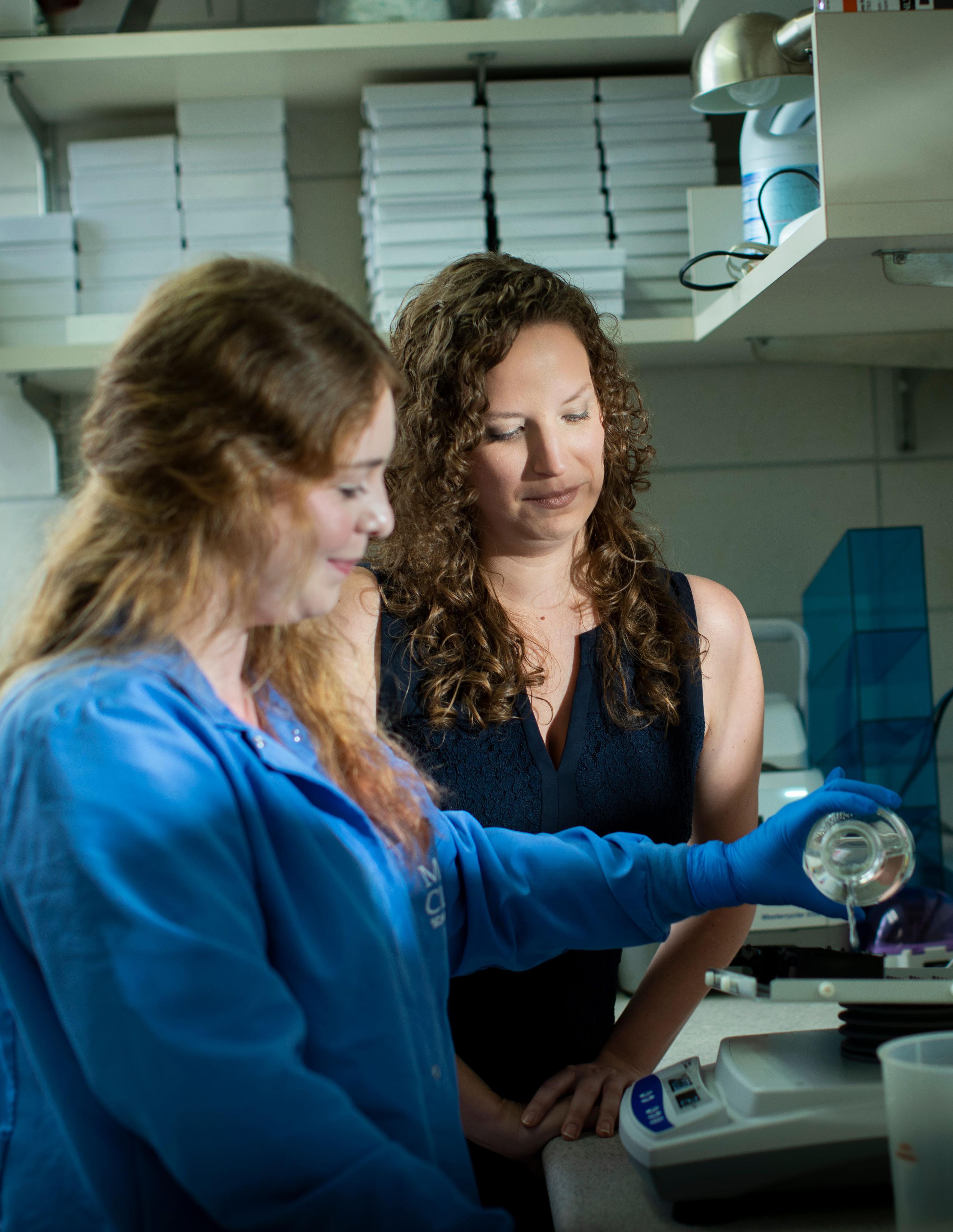
DR. KATELYN BRUNO

INTERVIEWEE
Dr. Katelyn Bruno
INTERVIEWER
Lindsey Rowley
I read your interview from 2019. It seems like much has changed since then.
[KB]: When interviewed in 2019, I was just getting my first grant. It was the start of my mentoring and independent research career. I was at Mayo Clinic, and still technically working under my mentor. I was getting my first assistant professor position, but I was still in somebody else’s lab. Now, I am now a tenure track assistant professor at the University of Florida.I am still what is considered an early-stage investigator because I’m at the start of the fast-accelerating trajectory of my career. I have my own independent lab now. I control all my research and I’m the primary mentor for PhD students. In addition, I have a technician and five undergrads in my lab. I’m also very involved with the Honors College and teach Honors courses.
It sounds like a lot has happened.
[KB]: Yes. And then there was COVID. My job really shifted focus to help with pandemic-related research. That’s what led to me winning all these awards this year with the Young Investigator and serving as commencement speaker; and all of that is related to the work I was able to do during COVID in the last five years.
So COVID rerouted your research?
[KB]: It’s primarily what I’m studying now. I was in the lab doing cell culture and animal-human data, human sample research and what’s called viral Myocarditis. I had a lot of experience building databases. At the start of the pandemic there was a need to build an easy-to-use database for a program called the US COVID Convalescent Plasma Expanded Access Program. It was specifically geared to give convalescent plasma – plasma from patients who’ve recovered to patients who actively have COVID. This is before vaccines were released. The goal was to expand access so that patients who were very sick could get access, and then we could study its safety and use. The Mayo Clinic asked my boss and me to create a database, giving us three days before it was announced by the President of the United States. We were supposed to enroll five thousand patients, and we ended up enrolling one hundred and five thousand patients in six months. I was a postdoctoral fellow at the time, still in training, still in the development stage of my career, and I ended up being in charge of the data integrity team, the team that was in charge of making sure all the physicians were putting the data in correctly. I ran a team of twenty people, all virtual. I was also co leader of the data management team that was in charge of every piece of data in the study. That was not my day job before, but we were called to action to help with something, and so I shifted focus.
I never thought I would be part of a program that would be announced by a press conference to the entire nation, and be indexed in the Library of Congress. Now, I’m mostly doing Viral Myocarditis research, which has been what I’ve done since I left Sam. I did my PhD starting in 2011 in Myocarditis, and it’s still what I’m studying today. But I still have a position at Mayo Clinic as a research collaborator. There’s a lot of eggs in different baskets.
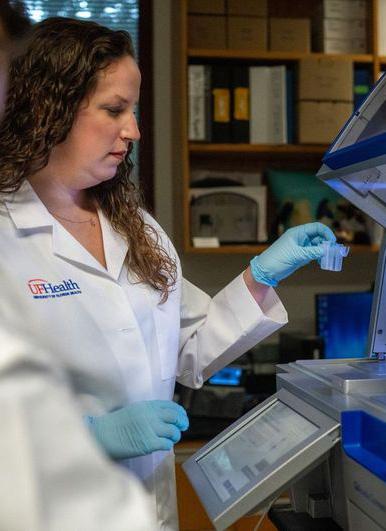
How do you balance your time between all those heavy, extensive projects?
[KB]: It’s hard. Everyone thinks that they need everything from you immediately, and it’s hard to decide who to prioritize. I feel bad when I can’t get things done as quickly as I would like, but I’ve got amazing PhD and undergrad students, so if there’s anything they can do, I delegate it to them to save time.
How did you first get involved in research?
What were some experiences that made you say ‘I want to do this’?
[KB]: It was actually in middle school. I was able to go to a summer camp at Cottey College, a university in Missouri. It’s a camp for STEM-related degrees. For a week, you took classes in logic, chemistry, biology and physics. That’s the first time I was exposed to real science and research, and that’s when I knew I wanted to be a scientist.
Then, I took three years of chemistry in high school, and I decided to go to Sam. During my first year at Sam, I reached out to Dr. Petrikovics and inquired about doing research and was able to get a summer internship with her between my freshman and sophomore years. I researched in her lab. I was able to do research on the body farm for a semester and present on it a couple of times, and this was when the body farm first opened. This is what I tell students to this day. If you have an interest in research, get involved.
“I WANT TO END MY CAREER AT SAM. CONTINUE TO DO RESEARCH. I WANT TO MAKE A DIFFERENCE FOR PATIENTS. I WANT TO DISCOVER SOMETHING THAT’S GOING TO BE USED FOR PATIENTS, A NEW DRUG, A NEW WAY TO DIAGNOSE DISEASE, SOMETHING THAT CAN HELP SAVE LIVES.”
What is the most memorable thing about being in the Honors College?
[KB]: Registering for classes early. I always thought it was funny being like, ‘oh I registered before the seniors did!’ The opportunities I received in the Honors College were the people I met and the support I had. I still talk to Dr. Young, Dr. Holmes, who was at my table for the alumni gala, and Dr. Gaertner, who was the President (2000-2010). I’m still friends with people from the Honors College. I was also an Honors Ambassador, so I was very involved. I got to go camping for two weeks in Dr. Young’s seminar. Not everyone gets that kind of opportunity, and it was a huge part of my journey.
If you could do it all again, is there anything you would do differently?
[KB]: I don’t use my Criminal Justice degree. I came to Sam because of the forensic science program, but if I hadn’t wanted that when I was 17, I would not have come to Sam. This snowball effect has led me to who I am today. My dad got cancer when I was in college, and that is what changed me from criminal justice to medicine. I wish I hadn’t gotten a C in genetics.
What are your other plans for the future?
[KB]: I do see myself coming back to Sam one day. I want to end my career at Sam. Continue to do research. I want to make a difference for patients. I want to discover something that’s going to be used for patients, a new drug, a new way to diagnose disease, something that can help save lives. I don’t want to study something for the sake of studying. You may not be able to get rid of a disease completely, but in my lifetime, I want to see if maybe we could diagnose it two days sooner or save 10% of lives. That’s the ultimate scientific goal of mine. Or maybe one day take President White’s job.
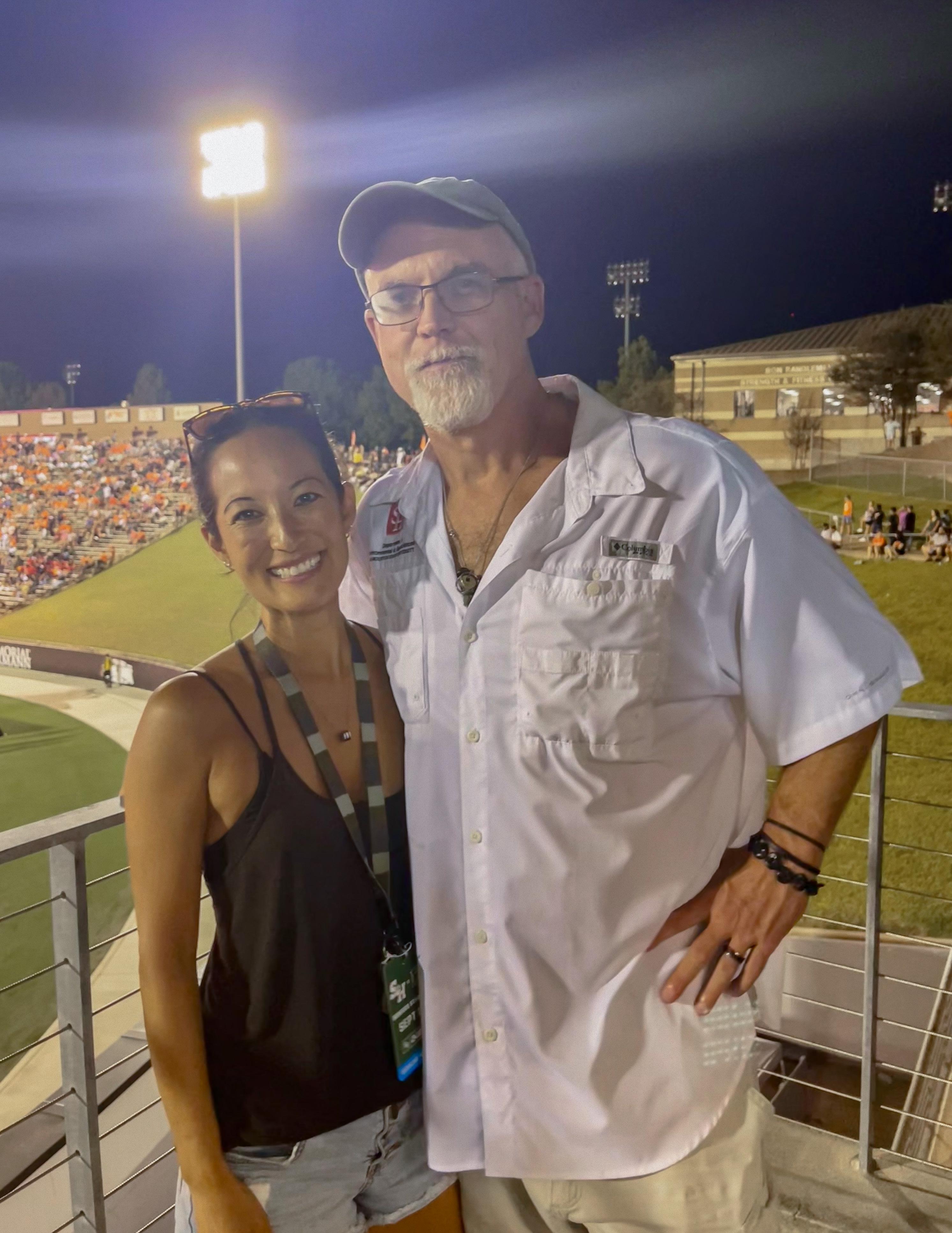
TWO MINDS, ONE MISSION FACULTY SPOTLIGHT
If you were to ask Honors Students which professors were their favorite or who made the biggest impact on their lives while at Sam Houston State, many of them would say Ava Fujimoto-Strait and Dr. John Strait.
The two have been working with SHSU for almost twenty years and are well known for hosting exciting seminars and Study Away courses in Hawaii and the Mississippi Delta.
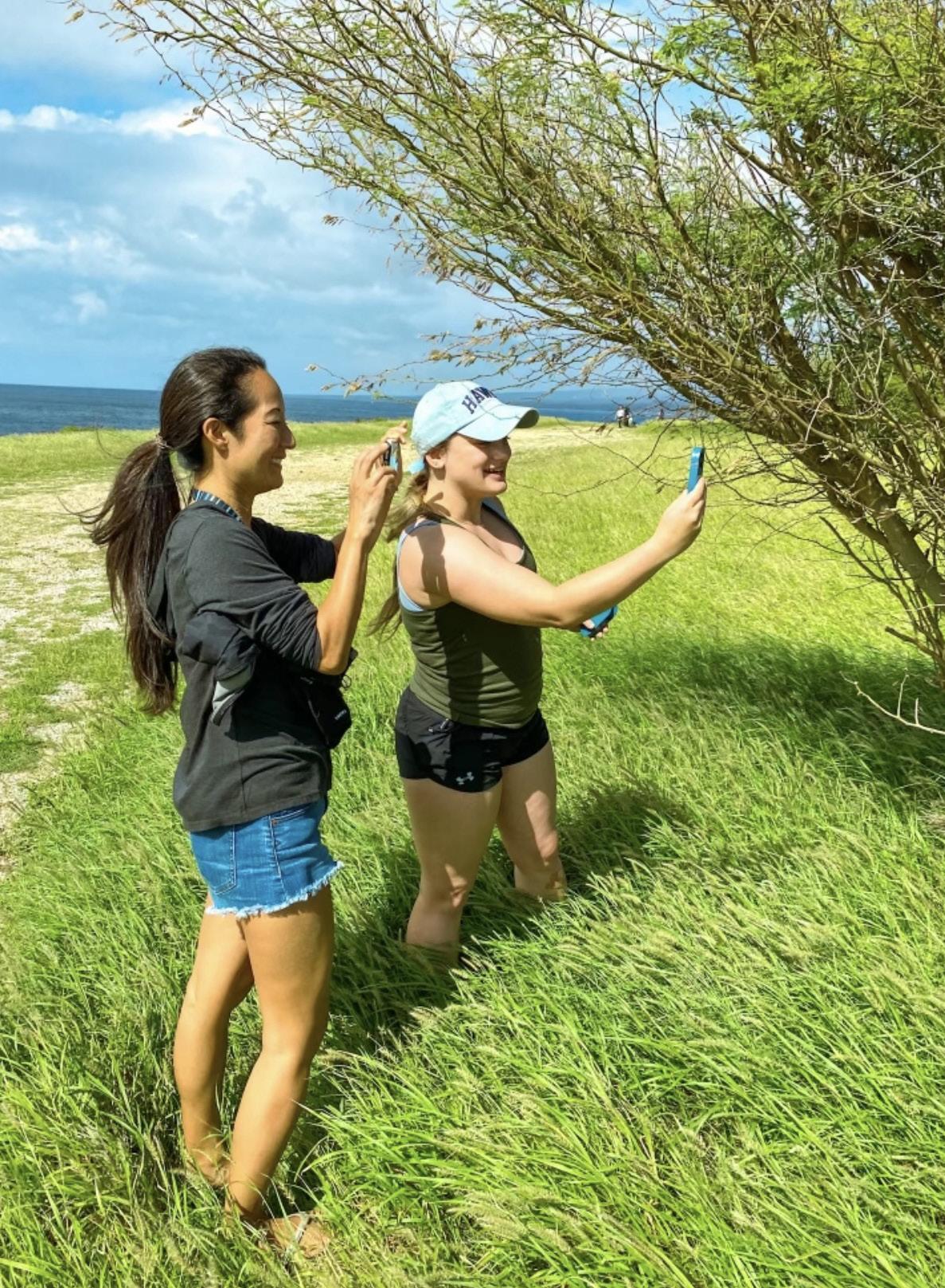
AVA FUJIMOTO-STRAIT
Ava Fujimoto-Strait was born in Hilo, Hawaii. She attended the University of Maryland, Baltimore County, where she majored in Geography with a minor in Biology and a Certificate in Cartography. Fun fact: She was also in their Honors College/ program! After receiving her bachelor’s degree, she attended graduate school at the University of Georgia for Geography with a specialization in Biogeography.
Fujimoto-Strait grew up watching her father, a communications professor, give lectures and speeches. Once, while attending graduate school, she was allowed to be a guest lecturer in a class of 250 students, which is when she knew for sure what she wanted to do – teach.
Fujimoto-Strait loves getting to know students and encouraging them to relate their life experiences to concepts that they are learning about in the classroom. She particularly enjoys teaching an introductory science core class and getting students excited about connecting scientific principles and equations to make sense of the weather they experience every day. She routinely teaches Weather and Climate and Environmental Geography, as well as coordinating the labs for Weather and Climate and Geologic Hazards.
“MAKE
THE MOST OF YOUR COLLEGE EXPERIENCE. MAKE CONNECTIONS WITH YOUR CLASSMATES AND PROFESSORS; SAY YES TO NEW OPPORTUNITIES AND ACTIVITIES; CONSIDER A STUDY ABROAD OPPORTUNITY OR FIELD SEMINAR; VOLUNTEER; AND PURSUE A MAJOR/FIELD OF STUDY THAT YOU LOVE AND ARE PASSIONATE ABOUT!”
Her research specializes in geographic education, specifically incorporating place-based/experiential learning in the classroom, working with geography high school teachers, and incorporating research skills and community engagement in field courses and experiences. Currently, she and her colleagues are working toward what will eventually lead to an NSF-REU (research experience for undergraduates) grant.
When asked for any advice to give students, Fujimoto-Strait replied, “Make the most of your college experience. Make connections with your classmates and professors; say yes to new opportunities and activities; consider a study abroad opportunity or field seminar; volunteer; and pursue a major/field of study that YOU love and are passionate about! This is your time to learn as much about the world, your major/field of study, and yourself.”
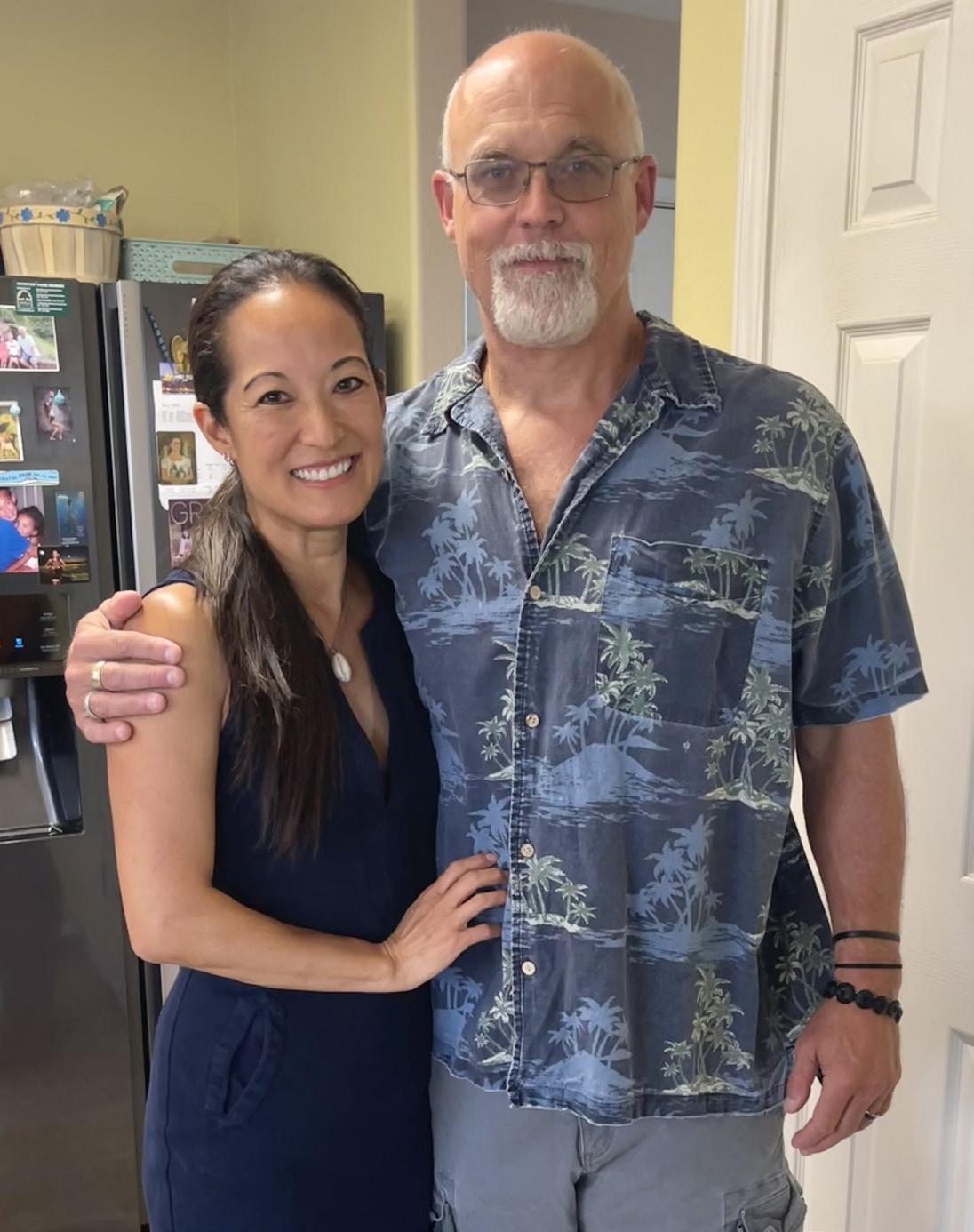
JOHN STRAIT
Dr. John Strait was born in Gallipolis, Ohio. He attended Wittenberg University in Springfield, Ohio, where he received his undergraduate degree in Geography with an Urban Studies minor. He then earned a master’s degree in Geography from Georgia State University and a PhD in Geography from the University of Georgia. If anyone had suggested to Strait thirty or so years ago that he would become a teacher, he would have laughed in disbelief. Teaching wasn't a career he actively pursued or even considered, he stumbled into it by accident.
After earning his bachelor’s degree, Strait was not able to find a job opportunity that interested him, so he enrolled in graduate school and began an assistantship that changed his career trajectory. What started as an obligation became a calling. He refers to himself as a “learner and a professional student” rather than an educator due to the unique privilege he has of learning alongside students. Knowledge flourishes in collaborative environments, and Strait learns just as much from the students as they do from him.
Strait regularly teaches People, Place & Environment, Weather & Climate, Cultural Geography, Urban Geography, The Mixed Plate: Field Course on the Cultural & Environmental Diversity of Hawai’i, and Music, Place & Civil Rights: The Geography & Soul of The Mississippi Delta. Additionally, he has led study away courses to Costa Rica, Spain, Morocco, Italy, & Sicily.
Strait’s research interests follow the intersections of racial and ethnic identities, urban residential dynamics, diaspora studies, and the geographic dimensions of social movements and the ways they manifest via expressions of music, visual art, and religion. The geographical dynamics of blues culture and music, and in the geographical dimensions of the Great Migration and the Civil Rights Movement, particularly the Black Freedom Movement, are of particular interest. His most recent research endeavors have focused on issues of cultural and environmental sustainability on the Hawaiian Islands and their interconnections to social movements from the continental U.S., such as the Black Power and American Indian movements. This research also incorporates the study of transcultural social movements (for example, the evolution of the Young Lords and the Polynesian Panthers in New Zealand) and their connections to the global diffusion of music and its relationships to ethnic identities.
Strait encourages students not to wait for permission to start pursuing their passions and interests. Whether it is securing an internship, starting a hobby, pursuing leadership roles, or simply meeting new people, go for it now. College is the perfect time to explore passions, even if something doesn’t seem to fall in line with a career path. If it is exciting, it is worth pursuing. Those experiences often lead to unexpected skills, connections, insights and opportunities.
“It’s important to attend sporting events and movie nights, participate in intramurals, rock-climbing clubs, etc. This is the time for students to surround themselves with a diverse collection of peers and mentors,” Strait said. “The connections made in college will shape the college experience just as much as a student’s coursework. People will push you to grow in ways you can’t predict. Some of the best learning happens outside formal education. Go to lectures, pick up a new hobby, attend workshops and have deep conversations with people from different backgrounds.”
Strait realizes most students want to graduate as quickly as possible, and while that makes sense (especially to parents), he thinks it is more important to graduate when students are prepared to take the next big step. Students should worry more about what and how much they are learning rather than just their grades. The opportunities available at a university don’t exist everywhere, so students need to take advantage of them as much as possible. This may mean taking courses outside of a degree plan or pursuing an internship or study abroad opportunity that delays an expected graduation date. It may also mean pursuing an extra minor or a double major.
“GROWTH HAPPENS WHEN RISKS ARE TAKEN. STUDENTS SHOULD BE WILLING TO STEP OUTSIDE OF THEIR COMFORT ZONE AND TAKE THE INTIMIDATING COURSE, APPLY FOR THE COMPETITIVE PROGRAM, TRAVEL ABROAD, OR ATTEND NETWORKING EVENTS EVEN IF THEY DON’T KNOW ANYONE.”
“Coping with what may seem to be the discomfort of something new can lead to self-confidence and may open doors they didn’t even know existed.”
BIG IDEAS, BOLD RESEARCH 2024 THESIS SPOTLIGHTS

RACHEL ZIEGLER (Spring 2024)
“A Comparative Analysis of Substance Abuse and Mental Illness Within a Prison Population.”
Throughout my years of research, I have examined the impact of serious mental illness and substance use disorder on the current generation of offenders in relation to recidivism rates and current treatment policies mandated and implemented in correctional facilities. In my analysis of surveys and prior studies, I concluded that, while being associated with additional destabilizing factors, the presence of alcohol and drug dependence disorders can be indicated as a substantial predictor of high rates of recidivism. When present alongside serious mental illness, an offender's criminogenic thinking influences the rationale of their belief system, including their personal justification for the activities in which they are involved. Therefore, the higher the influence of illegal drug dependence, specifically when combined with serious mental illness, the greater the chance of recidivism within two years following the initial release of an individual.
In my research, I concluded that the presence of co- occurring disorders, being the simultaneous presence of two or more mental disorders, within individuals correlated with earlier onsets of serious mental illness, impairing one's ability to control behavior schemes, as well as enhancing existing substance use disorders. I analyzed gender-specific data regarding the influence of serious mental illness and substance use disorder and found that females have a higher presence of serious mental illness and substance use disorder than their counterparts. However, despite females having a higher presence of these co-occurring disorders, males with substance use disorder and serious mental illness were found to be 65% more likely to recidivate within their first two years post-release.
“OVERALL, I CONCLUDED THAT RESEARCHERS NEED TO HAVE ADEQUATE ACCESS TO DATA PERTAINING TO THE RISK MANAGEMENT AND TREATMENT OF INMATES IN OUR NATION’S JUSTICE SYSTEM IN ORDER TO ANALYZE THE TREATMENT AND MANAGEMENT OF MENTAL DISORDERS IN THESE FACILITIES.”
Overall, I concluded that researchers need to have adequate access to data pertaining to the risk management and treatment of inmates in our nation's justice system in order to analyze the treatment and management of mental disorders in these facilities. The inability to access relevant data created difficulties in understanding the broader issue of mental health and substance use among prison populations. In my thesis, I highlighted the lack of public knowledge regarding co-occurring disorders, as well as an absence of education surrounding treatment options, as key factors in the high rates of recidivism. Finally, I concluded that if information regarding the topic is inaccessible, and unknown to the public, creating a solution would be unviable.
MAKAYLA NOLEN (Spring
2024)
“Exposing Injustice: The Disparities of Black Women Incarcerated for Self-Defense”
My thesis is intended to bring attention to a massive problem victims of domestic violence and intimate partner violence face, especially Black Women. Throughout my research I found a common trend of Black Women being charged with crimes related to self-defense. Often, these women are not given competent counsel, leading to their guilty or blind pleas. While working on this thesis, I learned a lot more than I expected to! I learned how to better manage my time, and to discover what lies behind the courtroom doors. Working on my thesis taught me how to research and interpret the information I came across. Overall, I have learned the importance of being educated on how the Criminal Justice System works and the heavy importance of making sure that defendants understand the language behind being arrested, charged and taken to trial.
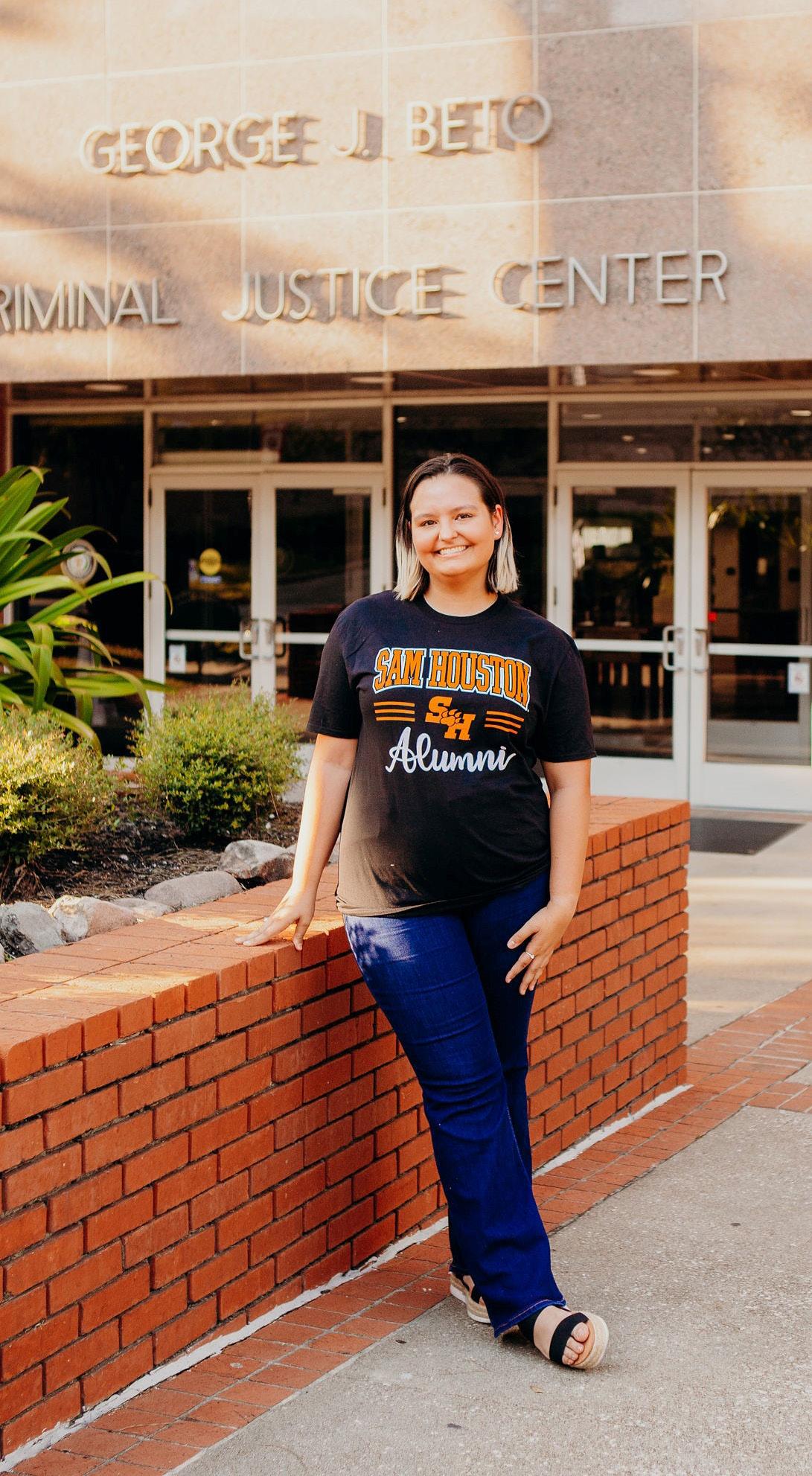
“MY THESIS IS INTENDED TO BRING ATTENTION TO A MASSIVE PROBLEM VICTIMS OF DOMESTIC VIOLENCE AND INTIMATE PARTNER VIOLENCE FACE, ESPECIALLY BLACK WOMEN.”
LILLIAN TISCHER (Fall
2024)
“The Connections of Child Abuse and Revictimization; A Meta-Analysis”
My thesis reviews the existing literature to examine the relationship between early childhood abuse and revictimization. Drawing from different databases using keywords such as “child abuse,” “child maltreatment,” “revictimization” and “revictimization factors,” 40 articles were gathered, and each article was reviewed to ensure the criteria were met. The analysis explores heightened vulnerability to revictimization from child abuse. By using existing evidence, this meta-analysis aims to create strategies for prevention, intervention, policy and future research. This research identifies significant relationships between child sexual abuse and adult sexual abuse. I found that child abuse is a strong predictor of revictimization and later abuse.
Completing this thesis took two years of work as I am a member of the McNair Scholars program, and from the moment I joined the program to the finish I have been continuously working on it.
I HAVE LOVED THE PROCESS AND WOULDN’T TRADE IT FOR THE WORLD. I WOULD SAY THAT IF YOU’RE CONSIDERING DOING A THESIS, DO IT!
BOWERS SCHOLAR SPOTLIGHT
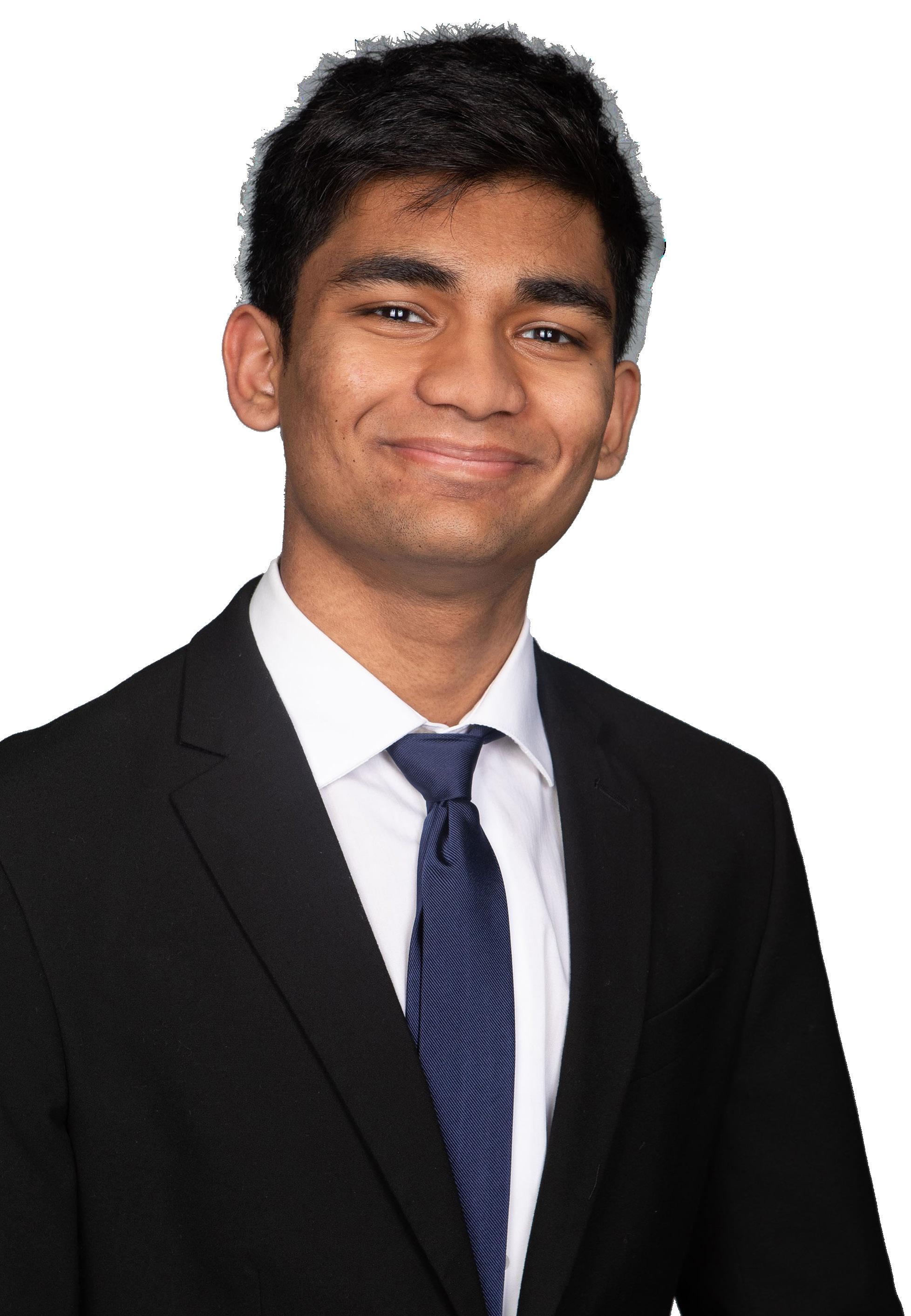
NIKHIL PATEL
MAJOR
Biomedical Sciences
“By receiving the Elliott T. Bowers Scholarship, I have been able to pursue my undergraduate education with less financial stress as a student. Additionally, this award has allowed me to represent the Honors College to the best of my ability. It serves as a reminder to attempt everything, learn at every possible chance and to always keep an open mind.” Nikhil Patel plans on attending medical school and pursuing a career in cardiology or nephrology.
$1,129,172
TOTAL SCHOLARSHIP FUNDING
13
STUDENTS COMPLETING A THESIS WITH $486.80
PROVIDED FOR THESIS SUPPORT
6,748 TOTAL VOLUNTEER HOURS
STUDY ABROAD
TO COSTA RICA, SCOTLAND, THAILAND, FRANCE, AND ENGLAND
$12,040.10
STUDENT FUNDING SUPPORT (CONFERENCES, STUDY ABROAD, RESEARCH, ETC.)
TO CANADA, CALIFORNIA, COLORADO, ST. LOUIS, MISSOURI, GALVESTON, SAN ANTONIO, AND DALLAS
EXCELLENCE IN EVERY FIELD COLLEGE REPRESENTATION
College of Arts and Media: 71
Animation: 21
Dance: 6
Mass Communication: 12
Film and TV Production: 3
Graphic Design: 2
Theatre: 8
Music: 8
Music Therapy: 4
Photography: 1
Studio Art: 6
College of Business Administration: 61
Accounting: 23
Finance: 10
International Business: 4
Supply Chain Management: 4
Banking and Financial Institutions: 4
General Business: 7
Economics: 1
Entrepreneurship: 5
Marketing: 7
Human Resource Management: 1
Management: 1
MGT Information Systems: 3
College of Criminal Justice: 168
Criminal Justice: 154
Homeland Security Studies: 7
Victim Studies: 13
College of Education: 38
*All Education
College of Health Sciences: 83
Food Science and Nutrition: 4
Health Sciences: 26
Human Performance and Wellness Management: 1
Interior Design: 4
Kinesiology: 20
Nursing: 23
Public Health: 5
College of Humanities and Social Sciences: 104
Psychology: 60
Communication Studies: 7
English: 13
Political Science: 12
Sociology: 2
Spanish: 1
Integrated Studies: 3
Philosophy: 3
Technical Communication: 1
College of Science and Engineering Technology: 214
Agricultural Business: 3
Agricultural Engineering Technology: 1
Animal Science: 20
Biomedical Sciences: 49
Biology: 28
Forensic Chemistry: 30
Chemistry: 11
Environmental Science: 7
Computing Science: 17
Cybersecurity: 8
Electronics and Engineering Technology: 7
Mathematics: 5
Construction Management: 1
Engineering Design Technology: 1
Geography: 6
Geology: 4
Physics: 8
Mechanical Engineering Technology: 7
Software Engineering: 5
Plant and Soil Sciences: 1
YOUR IMPACT, THEIR FUTURE
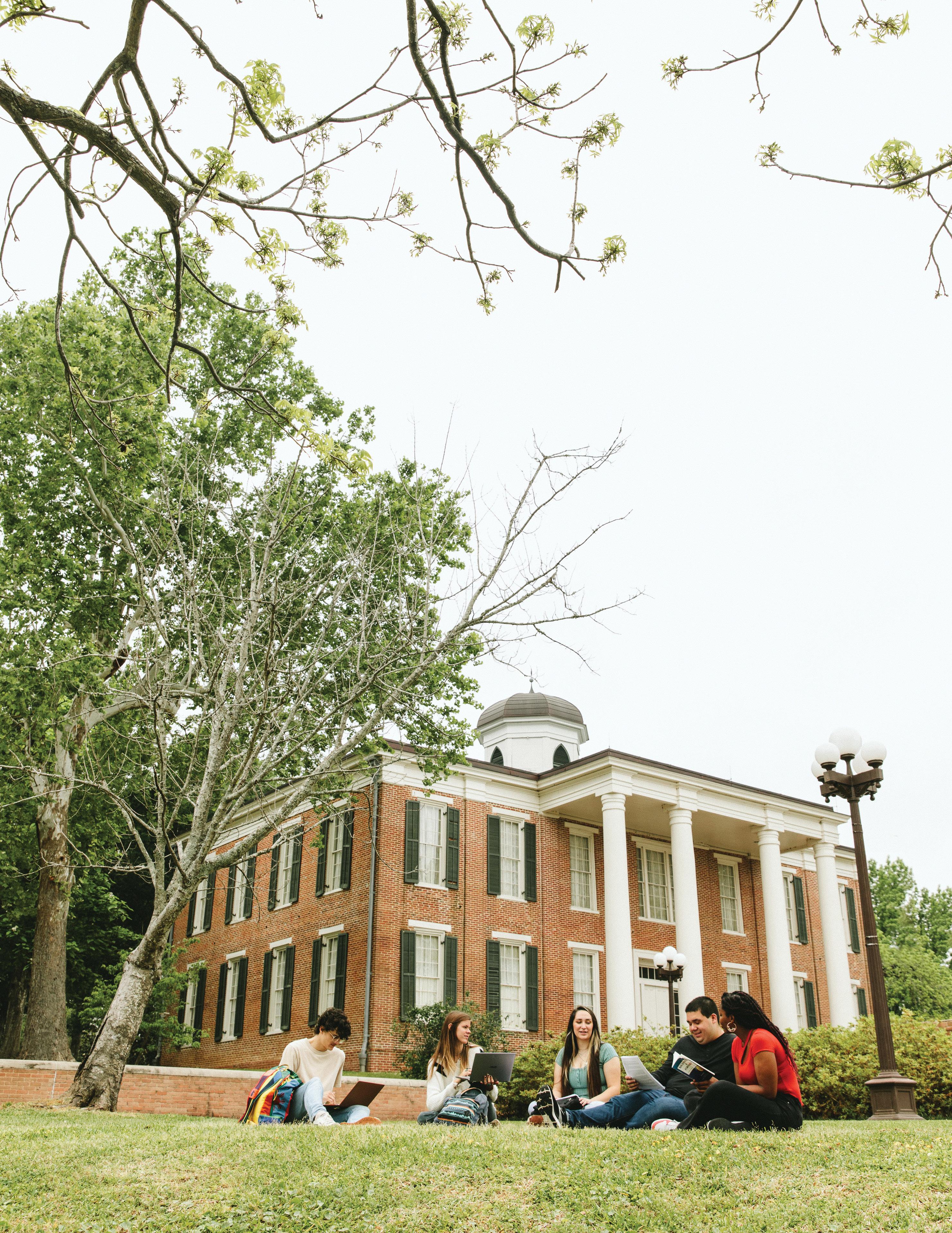
Giving offers dedicated support to the growth and success of the Honors College. No matter how large or small, your gift will directly impact the student experience by enriching the funding for teaching, programming, technology, research, and student engagement activities. Together, we can see how success unfolds for current and future Honors College students. You may share in the success of our students by donating today.
DESIGNATE YOUR GIFT TO HONORS
